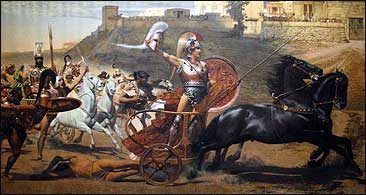|
|
|
|

Hector's body dragged behind a chariot around Troy.
Franz Matsch. The Triumph of Achilles, c1895.
Achillion Palace, Corfu, Greece.
from
BOOK II of VIRGIL'S AENEID.
[HECTOR WARNS AENEAS TO FLEE TROY]
It was the time when granted from the gods
The first sleep creeps most sweet in weary folk.
Lo! in my dream before mine eyes, methought,
With rueful chere I saw where Hector1 stood,
(Out of whose eyes there gushed streams of tears)
Drawn at a car2 as he of late had been,
Distained with bloody dust, whose feet were bowln3
With the strait cords wherewith they haled him.
Ay me, what one? that Hector how unlike,
Which erst returned clad with Achilles' spoils;
Or when he threw into the Greekish ships
The Trojan flame! so was his beard denied,
His crisped4 locks all clustered with his blood,
With all such wounds, as many he received
About the walls of that his native town.
Whom frankly thus methought I spake unto,
With bitter tears and doleful deadly voice:
'O Troyan light! O only hope of thine!
What lets5 so long thee staid? or from what coasts,
Our most desired Hector, dost thou come?
Whom, after slaughter of thy many friends,
And travail of the people, and thy town,
All-wearied lord! how gladly we behold.
What sorry chance hath stained thy lively face?
Or why see I these wounds, alas! so wide?'
He answered nought, nor in my vain demands
Abode;6 but from the bottom of his breast
Sighing he said: 'Flee, flee, O goddess' son!7
And save thee from the fury of this flame.
Our enemies now are masters of the walls;
And Troye town now falleth from the top.
Sufficeth that is done for Priam's reign.
If force might serve to succour Troye town,
This right hand well might have been her defence.
But Troye now commendeth to thy charge
Her holy reliques, and her privy gods.
Them join to thee, as fellows of thy fate.
Large walls rear thou for them: for so thou shalt,
After time spent in the overwandered flood.'
This said, he brought forth Vesta8 in his hands;
Her fillets eke,9 and everlasting flame.
|
[AJ Notes:
1. Son of Priam, Hector was the greatest Trojan warrior, killed in battle by Achilles, hero of the Greeks.
2. Chariot.
3. Swollen. Tyrwhitt, in his edition of Chaucer, says it is the participle of the Saxon verb to bolge, which gives the derivation of bulge.
4. Curled.
5. Obstacles.
6. Dwelt.
7. Aeneas was the son of Venus, Goddess of Love.
8. Roman Goddess of the hearth, whose flame Aeneas took from Troy to Rome.
9. Fillets; headdresses worn by the Vestal virgins. Eke; also.]
Source:
Surrey, Henry Howard, Earl of. "Second Book of Virgil's Aeneid."
Poetical Works of Henry Howard, Earl of Surrey. Robert Bell, Ed.
London: John W. Parker & Sons, 1854. 154-155.

| to Works of Henry Howard
|
Site copyright ©1996-2019 Anniina Jokinen. All Rights Reserved.
Created by Anniina Jokinen on August 31, 2009. Last updated January 2, 2019.
|
|
The Tudors
King Henry VII
Elizabeth of York
King Henry VIII
Queen Catherine of Aragon
Queen Anne Boleyn
Queen Jane Seymour
Queen Anne of Cleves
Queen Catherine Howard
Queen Katherine Parr
King Edward VI
Lady Jane Grey
Queen Mary I
Queen Elizabeth I
Renaissance English Writers
Bishop John Fisher
William Tyndale
Sir Thomas More
John Heywood
Thomas Sackville
John Bale
Nicholas Udall
John Skelton
Sir Thomas Wyatt
Henry Howard
Hugh Latimer
Thomas Cranmer
Roger Ascham
Sir Thomas Hoby
John Foxe
George Gascoigne
John Lyly
Thomas Nashe
Sir Philip Sidney
Edmund Spenser
Richard Hooker
Robert Southwell
Robert Greene
George Peele
Thomas Kyd
Edward de Vere
Christopher Marlowe
Anthony Munday
Sir Walter Ralegh
Thomas Hariot
Thomas Campion
Mary Sidney Herbert
Sir John Davies
Samuel Daniel
Michael Drayton
Fulke Greville
Emilia Lanyer
William Shakespeare
Persons of Interest
Visit Encyclopedia
Historical Events
Field of the Cloth of Gold, 1520
Pilgrimage of Grace, 1536
The Babington Plot, 1586
The Spanish Armada, 1588
Elizabethan Theatre
See section
English Renaissance Drama
Images of London:
London in the time of Henry VII. MS. Roy. 16 F. ii.
London, 1510, the earliest view in print
Map of England from Saxton's Descriptio Angliae, 1579
Location Map of Elizabethan London
Plan of the Bankside, Southwark, in Shakespeare's time
Detail of Norden's Map of the Bankside, 1593
Bull and Bear Baiting Rings from the Agas Map (1569-1590, pub. 1631)
Sketch of the Swan Theatre, c. 1596
Westminster in the Seventeenth Century, by Hollar
Visscher's Panoramic View of London, 1616. COLOR
|
|